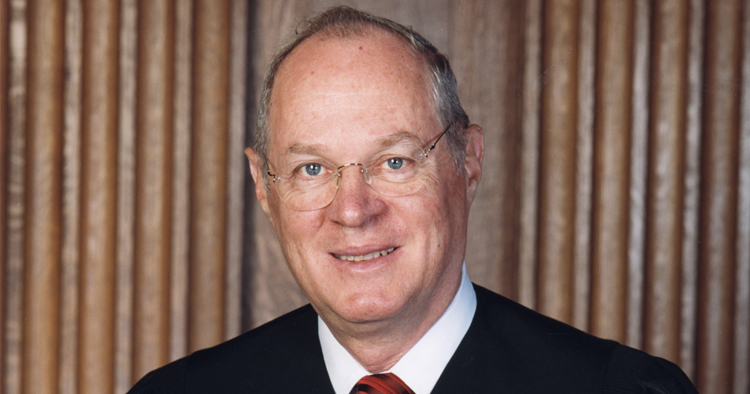Justice Anthony Kennedy, the Supreme Court's swing justice, announces his retirement

U.S. Supreme Court Justice Anthony Kennedy
Justice Anthony M. Kennedy announced his retirement Wednesday in a letter to President Donald Trump. Kennedy, 81, is stepping down July 31. He turns 82 next month.
Kennedy was nominated to the court by President Ronald Reagan in 1987 and joined the bench in February 1988.
“It has been the greatest honor and privilege to serve our nation in the federal judiciary for 43 years, 30 of those years on the Supreme Court,” Kennedy said in a press release. USA Today, the New York Times and the Washington Post have news coverage.
Kennedy said he decided to step aside because of a deep desire to spend more time with family. In the resignation letter, he expressed “profound gratitude for having had the privilege to seek in each case how best to know, interpret, and defend the Constitution and the laws that must always conform to its mandates and promises.”
Kennedy’s retirement gives Trump a chance to create a decisively conservative Supreme Court.
Trump said Wednesday that the process of choosing a replacement for Kennedy would “begin immediately,” USA Today reports. Trump said he would choose someone from a list of 25 potential nominees he would consider for the job. The complete list is here.
Senate Majority Leader Mitch McConnell promised a vote on Kennedy’s replacement this fall, the New York Times reports. The Senate currently has 51 Republicans.
The Times describes McConnell as having “led the blockade” against President Barack Obama’s failed Supreme Court nominee, Merrick Garland.
The New York Times describes Kennedy as “moderately conservative.” Kennedy wrote the decision finding that same-sex marriage is a constitutional right, and a decision upholding a race-conscious admissions program at the University of Texas. He has provided a liberal vote on issues such as abortion and criminal justice protections for minors and intellectually disabled people.
But Kennedy most often votes with conservatives, according to the Washington Post. He wrote the Citizens United decision, much criticized by liberals, that found corporations have a First Amendment right to expressly support political candidates. The Post describes him as “comfortable with the court’s protective view of business” and notes that he would have found the Affordable Care Act to be unconstitutional, a view that was not embraced by a majority.
Speculation surrounding a possible Kennedy retirement has swirled at least since Trump took office. In a Slate article published Tuesday, University of California at Irvine law professor Richard Hasen pointed to Kennedy’s conservative leanings in the most recent term and concluded they are evidence of a possible retirement.
Kennedy didn’t side with liberals in any significant 5-4 cases this term, Hasen said. On Tuesday, he sided with conservatives to uphold Trump’s travel ban and to find a potential First Amendment violation in required notices at crisis pregnancy centers. On Wednesday he joined with conservatives in an opinion that is a blow to public-sector unions.
Kennedy wrote a concurrence in the travel ban case calling on government officials to adhere to the First Amendment. “An anxious world must know that our government remains committed always to the liberties the Constitution seeks to preserve and protect, so that freedom extends outward, and lasts,” he wrote. Some viewed the statement as directed at Trump.
The justice also agreed to “punts” this term, joining a unanimous decision on standing in a case involving partisan gerrymandering and writing a narrow decision supporting the owner of Masterpiece Cakeshop, who refused to make a cake for a gay wedding.
Kennedy has “returned to his conservative roots and has given up decisively bucking his own party,” Hasen wrote. “The separate concurrence in the travel ban case felt to me like a Kennedy mic drop. He’s done all that he can do to fix the problems in American society. Now it’s up to those in power, and those who put them there.”
Gregory Angelo, president of Log Cabin Republicans, praised Kennedy’s opinions on gay rights in a statement. “No Supreme Court justice in history has done more to advance gay rights than Justice Kennedy,” Angelo said. “This is not something that is up for debate; in his 30 years on the bench of the nation’s highest judicial body, Justice Kennedy did not simply author the most pro-gay decisions of a Supreme Court justice—he authored all of them. Justice Kennedy will likewise leave a legacy as a staunch supporter of religious liberty, as his discerning opinion in this term’s Masterpiece Cakeshop case showed.”
David Cole, legal director of the American Civil Liberties Union, issued a statement calling Kennedy “a critical moderating force on the Supreme Court for decades.”
Alliance Defending Freedom president Michael Farris said the group respectfully disagreed with decisions in which Kennedy found rights not in the Constitution. “But we also praise Justice Kennedy’s insight and forceful celebration of First Amendment freedoms, his sensitivity to the danger of authoritarian government, and his refreshing desire to preserve and teach the necessity of freedom of speech to future generations.”
The Empirical SCOTUS blog said in December that one likely Trump pick is Judge Brett Kavanaugh of the U.S. Court of Appeals for the District of Columbia Circuit, a former Kennedy clerk. Kavanaugh is a likely pick if Trump’s aim “is to move the court at least minimally right of its current position,” according to the post by Adam Feldman, a fellow in the empirical study of public law at Columbia Law School.
Christine Kexel Chabot, a scholar in residence at the Loyola University Chicago School of Law, told the ABA Journal that she would expect Trump to nominate a justice in the mold of Justice Neil Gorsuch. “There is no reason,” Chabot said, “to expect the Republican-controlled White House and Senate to appoint a successor who will perpetuate Kennedy’s voting record.”
Related articles:
ABAJournal.com: “Trump adds 5 names to his Supreme Court shortlist, including former Kennedy clerk Kavanaugh”
ABA Journal: “Speculation swirls over Supreme Court retirements”



